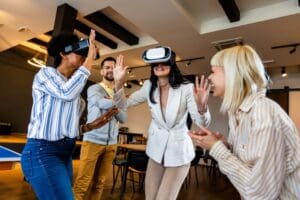As Digital Transformation Accelerates, Workforce Readiness Becomes Critical
Industries such as advanced manufacturing, engineering, and maintenance increasingly demand employees with both technical knowledge and hands-on experience. Traditional vocational training programmes often struggle to meet these requirements: high costs, safety risks, and limited access to equipment leave many learners underprepared for real-world roles.
Virtual Reality (VR) is emerging as a game-changing solution. By creating immersive, interactive environments, VR allows trainees to practise complex industrial tasks safely and effectively. UK startup Lincreation Ltd, founded in 2023 by entrepreneur Wei Guo, is leading this transformation with VR simulations tailored for vocational education.
Skills Gap in London
London faces a significant digital skills shortage. According to the University of Birmingham, over 380,000 full-time equivalent (FTE) jobs in the UK are at risk due to digital skills gaps, with a potential economic cost of £27.6 billion by 2030. London is among the regions most affected.
Two-thirds of London firms anticipate needing advanced digital capabilities in the next two to five years. Yet, barriers such as cost (52%), time constraints (48%), and limited access to quality local training (43%) hinder workforce development.
Lincreation: Bridging Theory and Practice
Wei Guo began his career in vocational education in China, founding a leading training provider. He noticed that many learners had strong theoretical knowledge but lacked practical experience—a gap particularly evident in high-cost or hazardous sectors.
“When I moved to the UK and started Lincreation, my goal was clear: to harness VR to make vocational training more accessible, effective, and scalable,” Wei explains.
His vision bridges classroom learning with real-world skill application, offering immersive, repeatable scenarios that prepare learners for the workplace.
How VR Training Works
Lincreation’s platform simulates a wide range of industrial tasks, including assembly line operations, machinery maintenance, safety procedures, and troubleshooting. Trainees can practise repeatedly in a virtual environment, building confidence before handling real equipment.
VR enables experiences that would otherwise be too dangerous, expensive, or complex to replicate physically. Accidents, equipment damage, and downtime are reduced, while skill acquisition accelerates. The platform is scalable, allowing organisations of all sizes to standardise training across multiple locations.
Evidence of Effectiveness
Research supports VR’s benefits. A 2020 study in Computers & Education by Radianti et al. found that VR-based training improves engagement, motivation, and knowledge retention. Similarly, University College London’s Immersive Virtual Environments Laboratory reports measurable improvements in confidence and technical skills across multiple disciplines, highlighting VR’s unique ability to provide presence and interactivity that traditional methods cannot replicate.
Lincreation’s clients report tangible results. Apprentices master complex machinery faster, make fewer errors, and gain operational confidence.
“Our trainees approach tasks with greater assurance and efficiency. This benefits both learners and employers by reducing costs and downtime,” says Wei.
Expanding Access and Inclusion
VR training also promotes inclusivity. Learners facing geographic, financial, or logistical barriers can gain practical experience without access to costly equipment. By lowering these obstacles, VR opens doors for a broader range of individuals to enter technical industries, helping address London’s growing skills gap.
Looking Ahead: Democratising Vocational Education
Lincreation aims to make vocational training accessible globally, providing affordable VR solutions to regions and communities lacking quality training infrastructure.
“As the workforce evolves, so must training. Immersive technology can level the playing field, giving learners everywhere the opportunity to develop essential skills. Our mission is to make vocational education inclusive, effective, and adaptable to the modern economy,” Wei reflects.
Shaping the Future of Workforce Training
In an era of rapid technological change, equipping employees with job-ready skills is critical. London faces an acute digital skills shortage and urgent reskilling needs. VR offers a timely, scalable solution, helping organisations bridge this gap with immersive, effective, and cost-efficient training.
Lincreation combines research-backed methods with practical applications, setting a new standard for vocational education—safe, immersive, and repeatable learning experiences that are scalable and inclusive.
For businesses, the benefits are clear: training costs are reduced, skills are acquired more quickly, workforce confidence improves, and operational risks are minimised. Companies looking to remain competitive in a fast-changing economy may find VR-based training a practical way to strengthen their workforce and prepare for the future.
Read more:
VR-Powered Training: Closing the Skills Gap and Boosting Workforce Efficiency in London

